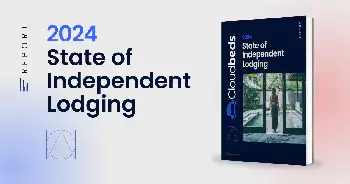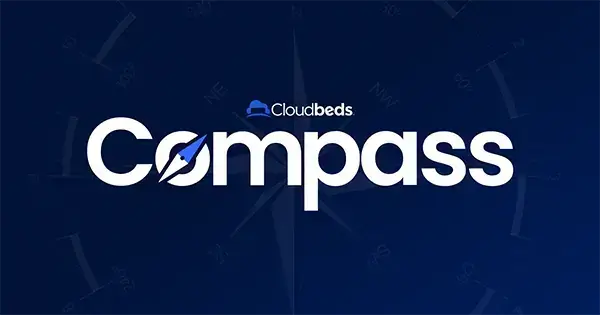
By Cloudbeds
How loyal are your guests?
It’s a question that’s easy for hoteliers to answer in general terms (“super loyal!”) but not always easy to quantify or explain. What exactly does guest loyalty mean today, and how do you measure it?
For independent properties, another challenge is competing with global loyalty programs offered by big hotel brands and online travel agencies (OTAs).
Whether you operate a full-service hotel, hostel, inn, short-term rental, or other type of accommodation, here we share ways to build and maintain guest loyalty with or without a loyalty program.
What is hotel guest loyalty?
In the hotel industry, guest loyalty can be defined as a guest’s faithfulness to one property over other accommodation choices. Typically, loyalty involves both emotion and purchase behavior. Loyal guests choose to return to a hotel because they appreciate or feel passionate about its service, staff, location, rooms, design, or other features.
Loyalty often grows with familiarity. The more guests stay at a property, the more comfortable they become – provided their needs are taken care of. This can apply to individual hotels as well as to an entire brand or group of hotels.
In today’s discount-driven marketplace, hotels often try to “buy loyalty” from travelers with special rates and value-adds. While value is an important aspect of loyalty, decisions based primarily on price are not a demonstration of loyalty. Loyalty can’t be bought; it must be earned.
Why is guest loyalty important for hotels?
By staying more frequently, repeat guests generate more revenue for hotels. In the US, for example, 54% of room nights for branded hotels were booked by loyalty program members in 2019, according to Kalibri Labs. And by increasing demand for rooms, frequent guests enable hotels to charge higher prices.
In marketing, it’s often said that it costs five times more to acquire a new customer than to keep an existing customer. For hotels, loyal customers are more likely to complete a direct booking than book through an OTA, saving the hotel commission fees. According to Bain & Company, return customers also lower a company’s acquisition costs over time, are more likely to refer others, and will often pay a premium rather than switch to a competitor they don’t know.
Moreover, the more loyal your guests are, the less likely they will be tempted by the increasing array of accommodation choices on the market today. There are benefits to staff morale, too. Employees may find it rewarding to get to know frequent guests and build relationships over time.
5 key ways to measure guest loyalty
While it’s difficult to quantify the emotional aspect of guest loyalty, measuring booking behavior is easy. Here are five basic ways to measure guest loyalty. You should be able to easily find this data in your property management system (PMS).
- Stay frequency (stays or room nights)
- Recent stay activity (for example, over the past year)
- Average spend per stay (including food & beverage and ancillary services)
- Average annual spend
- Total spend to date
Three additional measures are:
- Customer lifetime value (CLV). An estimate of the revenue a guest will bring to the property during the lifetime of an average business relationship.
- Churn rate. The percentage of guests who stop staying at the hotel within a given period such as a year.
- Net Promoter Score™ (NPS). A metric derived from the guest survey question, “On a scale between 0 and 10, how likely are you to recommend us to a friend or colleague?” Respondents are grouped into different categories, including promoters (score 9-10), passives (7-8), or detractors (0-6). NPS is calculated by subtracting the percentage of detractors from the percentage of promoters. Because customers are asked if they are willing to put their own reputation on the line, NPS is considered to be a strong indicator of loyalty.
Hotel guest loyalty programs
A loyalty program is a membership program or club that provides rewards points for purchasing the company’s products or services, in addition to perks and privileges for being a loyalty member. Typically, members earn loyalty points or credits that can be exchanged for rewards such as free services or upgrades. Some hotel rewards programs feature membership tiers; the more members spend, the higher the tier they qualify for and the better the perks.
In the travel industry, most major hotel brands operate a hotel loyalty program, including Marriott Bonvoy, with more than 160 million members; IHG Rewards Club, with over 100 million members; and Radisson Rewards, with over 170 million members.
Many OTAs offer loyalty programs, too. Members of Booking.com’s Genius program receive an instant discount of up to 20% off the room rate at participating properties. In 2022, Expedia Group announced it would consolidate all its brands under a new loyalty program called One Key. By offering discounts and perks, OTA programs are highly effective at enticing members to book through them rather than directly with hotels.
Guest loyalty and the modern traveler
Given the massive memberships and marketing clout of these programs, how can independent hotels compete? Perhaps a better question is, do you want to compete? Loyalty programs are time-consuming and expensive to operate, and independent properties often lack the resources required to maintain them.
Besides, not all travelers love loyalty programs. Many consumers feel they are no longer worth the effort, that accumulating points takes too much time, and that points carry little value and redeeming them is a headache with blockers like blackout dates casting a shadow over the program. In fact, less than half (46%) of high-value travel bookers are motivated by loyalty programs, according to Google. As for those who are motivated by perks and discounts, are they the ideal target market for independent properties?
There are many ways to build hotel customer loyalty without a loyalty program. Just ask Apple and Airbnb, two of the world’s best-loved brands despite neither offering a loyalty program. Instead, independent hotels should channel resources into offering distinctive, personalized experiences and customized rewards and perks.
10 effective ways to improve guest loyalty
Forget deep discounts and worthless points, here are ten more practical ways for independent properties to build and maintain long-term guest loyalty.
1. Provide an unrivaled guest experience
The more you can distinguish your property from competitors, the more likely your guests will return, spend more money on property, and provide referrals to others. This means providing the quality, service, ambience, and personalized guest experiences that only an independent property can offer.
2. Be consistent
A big reason why travelers are loyal to hotel chains is they promise a consistent, predictable customer experience across properties. While your guests may prefer surprises, they also want to know that their basic needs will be met on every stay. At a basic level, this includes efficient, courteous service, a comfortable room, and fast, reliable technology.
3. Exceed guest expectations
Meeting guest expectations may not be enough. According to Salesforce, 45% of consumers will switch brands if a company doesn’t actively anticipate their needs. Independent hotels need to go above and beyond to anticipate and exceed guest expectations, eliciting emotional responses that will help increase retention rates.
4. Understand your guests
The more you know about your guests, the better you can serve them, and the more likely they will be to return. Be diligent about collecting guest information and recording details in the guest profile. At the same time, be sure to comply with guest preferences and privacy regulations concerning the handling of personal information.
5. Recognize your guests
Frequent guests expect to be recognized, not treated as just another unknown guest. Flag reservations so hotel management and staff know when they’re arriving and can greet them by name. Considering posting photos of frequent guests in the back office.
6. Monitor stay activity
Use the PMS to track stay frequency and spend so you know who your most loyal and valuable guests are. Remember that all loyal guests aren’t of equal value. Those who stay the most frequently, book directly, and spend the most money on property should receive the most preferential treatment.
7. Provide incentives and rewards
Offer incentives to encourage guests to come back and rewards for achieving milestone stays. Incentives are particularly effective in influencing behavior because guests know in advance how they will be rewarded. For example, on the second stay, inform guests that they will receive a free night once they have stayed for a total of 10 nights.
8. Offer a variety of perks & benefits
Here are just a few of the loyalty perks and rewards offered by hotels to their guests:
- A discount. Guarantee a discount off your best available rate (BAR) on future bookings. This will allow you to flex the rate according to how busy you are.
- A room upgrade. Guests love upgrades, and day-of-arrival upgrades come at little cost to the hotel if the room would otherwise sit empty.
- A welcome amenity. Instead of the usual chocolates or fruit, get creative. On milestone stays, offer something of higher value such as a branded bathrobe, umbrella, or golf shirt. Always include a personal note from the manager.
- Free breakfast. If you offer a buffet, free breakfast can be provided at a relatively low cost to the property. Or offer a discount on F&B and other services, like a spa treatment, to encourage guests to spend more time (and money) on property.
- Early check-in or late checkout. These are popular perks for travelers but may be challenging to manage if you operate a small property.
- Free parking, premium Wi-Fi, and other perks. Customize benefits according to what’s possible and feasible at your property. What can you offer that has a special connection to your guests, property, or destination?
9. Customize rewards
Rather than give all frequent guests the same rewards and benefits, ask for their preferences. That way you’ll avoid giving wine to a guest who doesn’t drink or free parking to a guest who would prefer free breakfast. Instead, offer meaningful perks that guests will actually use and enjoy, thereby increasing guest satisfaction overall. For clues, pay attention to what amenities guests eat or take with them and which ones they leave behind.
10. Join a loyalty network
Consider joining one of the loyalty networks designed for independent hotels such as VOILÀ Hotel Rewards, Stash Rewards, The Guestbook, or Global Hotel Alliance. You may also be able to leverage the popularity of loyalty programs offered by airlines, banks, credit card companies, and other companies by joining as a partner.
Leverage technology to build and manage guest loyalty
Finally, take advantage of the many tools available to help your property build, manage, and track guest loyalty. This includes the PMS, CRM system, guest engagement solution, online reputation management tool, and loyalty program solution.
A guest engagement platform like Whistle for Cloudbeds will help you engage with guests at every touchpoint along the traveler journey through automated messages, live chat, upsell offers, post-stay guest surveys, review requests, and a host of additional features to help you understand and deliver on guest preferences.
And an integrated hospitality platform will stitch all the core software components together, consolidating guest data under one shared profile that will help you track guest stays, record preferences, and personalize the guest experience.
This way, the next time someone asks, “How loyal are your guests?,” not only will you respond “Super loyal!,” but you’ll also have all the data to explain how and why.



















